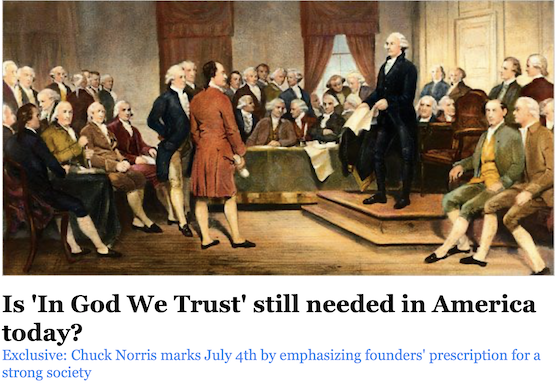Chuck Norris used his July 1 WorldNetDaily column to push the idea of religion in government, citing his usual dubious sources along the way:
As I wrote in my New York Times bestseller, “Black Belt Patriotism,” government isn’t the answer. And neither is education, at least without religion. As Benjamin Rush, a signer of the Declaration of Independence, explained, “Without religion, I believe that learning does real mischief to the morals and principles of mankind.”
Our founders had a better answer than government or even education for a basis of morality and civility. God is the answer. God is the moral compass of America. Or He should be, if we ever want to restore morality in our homes and civility to our land. Our founders believed morals flowed from one’s accountability to God, and that, without God, moral anarchy would result.
While many atheists today like to think that science has disproven the idea of a Creator, the fact is that it hasn’t. Scientists can’t rule out God, and certainly most people don’t believe that. A 2022 Gallup Poll show that roughly 81% of Americans still believe in a Creator.
In fact, contrary to popular belief, God-believing scientists are everywhere, as a survey by the American Association for the Advancement of Science showed. Indeed, in 2019, over 1,000 scientists from around the world signed a statement publicly expressing their skepticism about the contemporary theory of Darwinian evolution, and the list continues to grow!
That petition is being forwarded by the creationists at the Discovery Institute, and it has some problems, as the Wikipedia page on it states:
The statement has been criticized for being misleading and ambiguous, using terms with multiple meanings such as “Darwinism”, which can refer specifically to natural selection or informally to evolution in general, and presenting a straw man fallacy with its claim that random mutations and natural selection are insufficient to account for the complexity of life, when standard evolutionary theory involves other factors such as gene flow, genetic recombination, genetic drift and endosymbiosis. Scientists and educators have noted that its signatories, who include historians and philosophers of science as well as scientists, are a minuscule fraction of the numbers of scientists and engineers qualified to sign it. Intelligent design has failed to produce scientific research, and been rejected by the scientific community, including many leading scientific organizations. The statement in the document has also been criticized as being phrased to represent a diverse range of opinions, set in a context which gives it a misleading spin to confuse the public. The listed affiliations and areas of expertise of the signatories have also been criticized.
Norris also wrote:
Historian David Barton at Wallbuilders.com taught me: Many today may not realize that there was an active clergyman (Presbyterian minister John Witherspoon) among the signers of the Declaration of Independence. Two others had previously been ministers. Others were sons of clergy or had studied theology. Of the 39 signers of the Constitution, 37 were professed Protestant Christians (though at least one of those, Benjamin Franklin, was probably a deist), and two, Daniel Carroll and Thomas Fitzsimons, were Roman Catholics. They were a diverse group of men in some respects, but they were united by their belief in a Creator God.
As we pointed out in his previous cites of the man, Barton has been caught spreading numerous false and misleading claims, to the point that his book on Thomas Jefferson was withdrawn by its publisher due to its errors, though WND not only continued to sell the book, it published its own version of the book with only minor corrections.
At the end of his column, Norris recommended various resources for those with “doubts, struggles or wants to learn more about God, religion or the Bible”; one was Barton’s “The Founders’ Bible,” which he called “the sacred text of all sacred texts with a plethora of historical notes and commentary from America’s founders.” But given Barton’s history of prevarication and his enthusiasm for revisionist history and painting the founders as “hero-saints” would seem to put this book in the dubious category as well.
